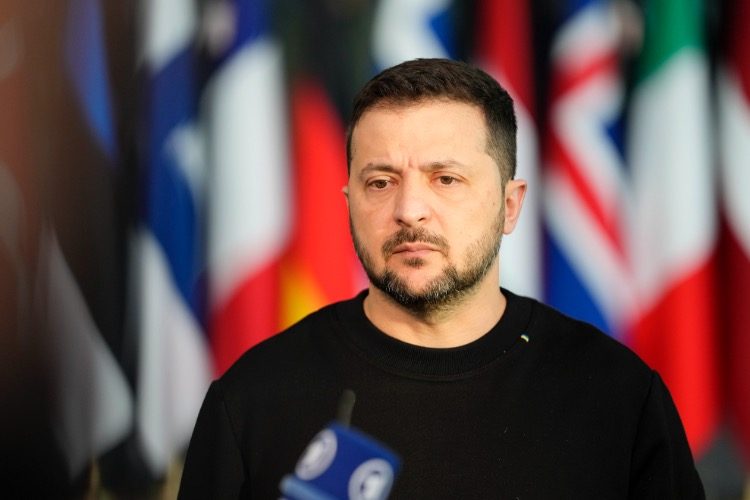
President Joe Biden’s latest request for supporting Ukraine aid will be put on hold as U.S. lawmakers vote on the more “pressing” priority of helping to defend Israel in its war with Hamas, newly elected House Speaker Mike Johnson divulged on October 29 in a Fox News interview.
“We’re going to move a stand-alone Israel funding bill this week in the House,” Johnson declared. “I know our colleagues, our Republican colleagues in the Senate, have a similar measure,” he added, providing no further details as to when the House might take up the latest proposed round of funding for Ukraine.
Biden has urged linking aid to both Ukraine and Israel in a $106 billion emergency funding bill, instead of permitting lawmakers to separately vote on the issues. Earlier this month, the Biden administration revealed a plan to supply an additional $61.4 billion to fund Ukraine’s conflict with Russia, $14.3 billion for Israel, as well as $9.2 billion for humanitarian aid for both places.
Congress hitherto authorized $113 billion in Ukraine aid in four rounds of legislation, yet Republican objections to increased funding for Ukraine have been on the rise. At the moment, most House lawmakers in the majority party are against sending more aid to Ukraine, and disputes over the issue among Republicans led to the deposition of former House Speaker Kevin McCarthy.
Johnson proclaimed that the stand-alone Israel bill would garner strong bipartisan support in both the House and the Senate. “My intention is not to use this for any partisan political gamesmanship,” he said. “This is a very serious matter.”
The new speaker, who has been a critic on Ukraine aid, argued in a Fox interview aired last Thursday that the Biden administration has not given a blueprint of what it hoped to attain with such immense aid to Ukraine and how it hopes to bring a stop to the Russo-Ukrainian conflict. By contrast, Johnson seemed to have no doubts about supporting Israel.
“We believe that that is a pressing and urgent need,” Johnson declared. “There are lots of things going on around the world that we have to address, and we will, but right now, what’s happening in Israel takes the immediate attention, and I think we have got to separate that and get it through.”
Johnson, who gave a speech on October 28 at the Republican Jewish Coalition summit in Las Vegas, said he heard “firsthand reports” at the event on Hamas’ brutal assaults on Israelis. “This is a priority for our country, and we cannot allow the brutality and the just unspeakable evil that is happening against Israel right now to continue,” he declared. “We’re going to stand with our friends.”
Meanwhile, news outlets NBC news reported on October 28 that the unprecedented transfer of U.S. taxpayer dollars to Ukraine over the past two years has not led to new jobs or benefits for Americans.
Although more than $44 billion has been channeled to U.S. defense contractors as a result of military support for the Kyiv regime since February 2022, those companies have been slow to hire American employees to cope with the rise in demand, NBC stated.
According to defense-industry analysts, it would require “several more years” for arms manufacturers to achieve production levels that can spill over to the wider economy. A tight labor market and supply-chain problems were two of the reasons cited for the situation.
For instance, RTX Corp., formerly Raytheon, lamented about problems obtaining both raw materials and qualified employees in an earnings report published October 24. While the company recently inked a $3 billion contract to refill the United States’ depleted weapons stockpiles and anticipates another $4 billion over the next two years, CEO Greg Hayes admitted to investors that it would require another two or even three years to deliver the goods.
Likewise, Lockheed Martin forecasted a mediocre rise in revenue for 2023 notwithstanding soaring demand for its Javelin and HIMARS missile systems in Ukraine. Although the firm hired 2,000 people in 2022 and declared to have 900 openings in its missile and fire-control division, only 40 of those were based at the factory where it produces systems to be deployed to Ukraine, the company told NBC.
These figures seem to go against Biden’s statements last week that the $61.4 billion more in military aid for Ukraine would translate into more jobs for Americans.
“When we use the money allocated by Congress, we use it to replenish our own stores, our own stockpiles with new equipment, equipment that defends America and is made in America,” Biden alleged during a televised address, alluding to “Patriot missiles for air defense batteries made in Arizona, artillery shells manufactured in 12 states across the country … and so much more.”
White House aides have also purportedly been disseminating similar claims to representatives from both Republican and Democrat Parties, news agency Politico reported on October 25, quoting various sources who participated in the messaging.
Earlier this month, the Pentagon disclosed that billions of dollars in additional funding was necessary to rebuild U.S. weapons stocks while continuing to support Ukraine’s, and now Israel’s, military.
Furthermore, Time magazine recently reported that Ukrainian President Volodymyr Zelensky is poised to conduct a “major shake-up” of the country’s military and political leadership, his aides have testified.
Zelensky’s impending reshuffle was meant to show “accountability” for Ukraine’s mediocre progress in its counteroffensive against Russia, as well as address the apparently rising opposition to Zelensky’s plans to perpetuate tensions regardless of the outcome.
While Zelensky remained dogged in his plans to “defeat” Russia, his “stubbornness” has become borderline “messianic,” one of his advisors posited, on condition of anonymity. “He deludes himself. We’re out of options. We’re not winning. But try telling him that.”
Nonetheless, the reality on the battlefield contradicts Zelensky’s plans of emerging victorious over Moscow, with reservations about Ukraine’s final outcome rising. According to one of Zelensky’s aides, “some front-line commanders … have begun refusing orders to advance, even when they came directly from the office of the president.”
“They [the military] just want to sit in the trenches and hold the line. But we can’t win a war that way,” the aide said, acknowledging that Ukrainian forces were not actually “moving forward.”
To boot, Ukraine was not well geared up for the upcoming winter, the aides hinted, adding that blaming faltering infrastructure and other challenges solely on Russia might not be successful this year.
“Last year, people blamed the Russians,” one of them said. “This time, they’ll blame us for not doing enough to prepare.”
To address such challenges, Zelensky is slated to conduct a major reshuffle of his team shortly, with the “shake-up” impacting both military and civilian leadership. “At least one minister would need to be fired, along with a senior general in charge of the counteroffensive,” the article indicated citing the aides, who did not reveal the names of the potential scapegoats. The move is primarily intended to display “accountability” for the lack of military victories on the battlefield, they admitted.
Also, Zelensky felt “betrayed” by his Western backers, who have refused him the support and attention he has grown used to, his aides elaborated. “Zelensky feels betrayed by his Western allies. They have left him without the means to win the war, only the means to survive it,” Time reported, citing a member of his team.
“The scariest thing is that part of the world got used to the war in Ukraine,” Zelensky said. “Exhaustion with the war rolls along like a wave. You see it in the United States, in Europe. And we see that as soon as they start to get a little tired, it becomes like a show to them: ‘I can’t watch this rerun for the 10th time.’”
In early June this year, Kyiv started its counteroffensive against Russia, but it has so far failed to obtain significant battlefield gains. In September, Russian President Vladimir Putin claimed that Kyiv’s counteroffensive had effectively failed, causing heavy losses for the Ukrainian military. Based on Moscow’s estimates, Kyiv had lost more than 90,000 troops, as well as hundreds of pieces of military hardware, including Western-supplied tanks and armored vehicles.



